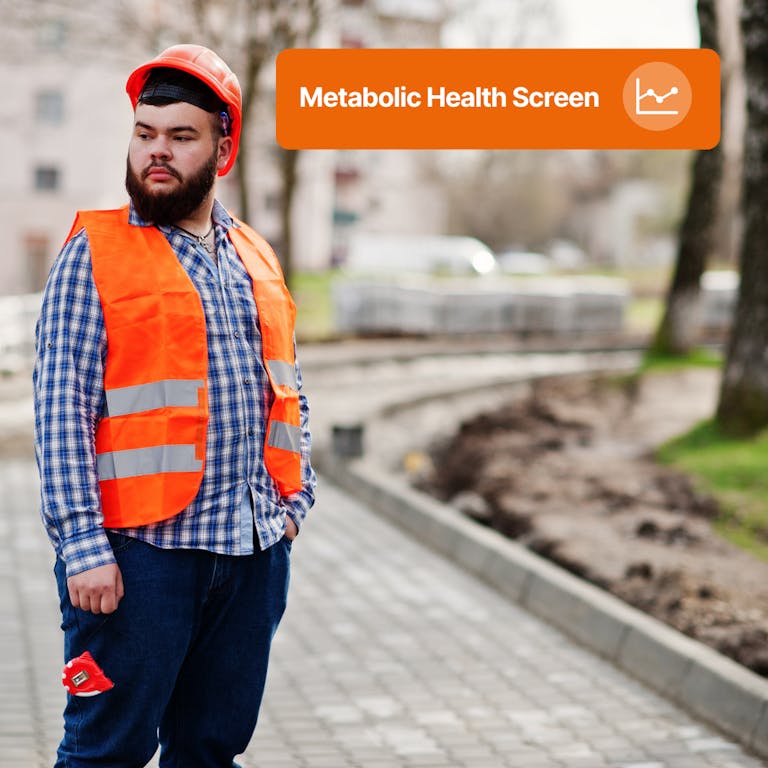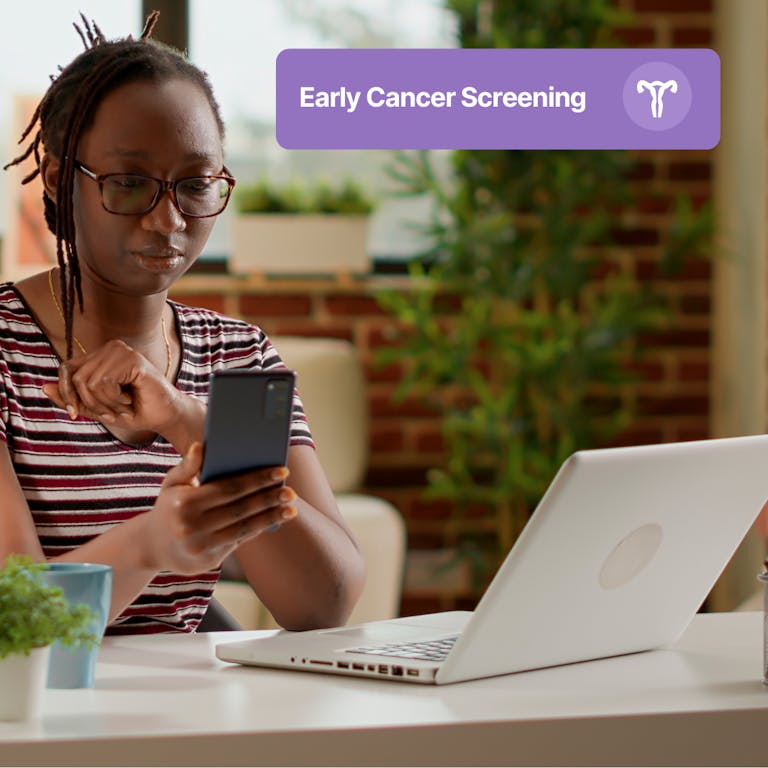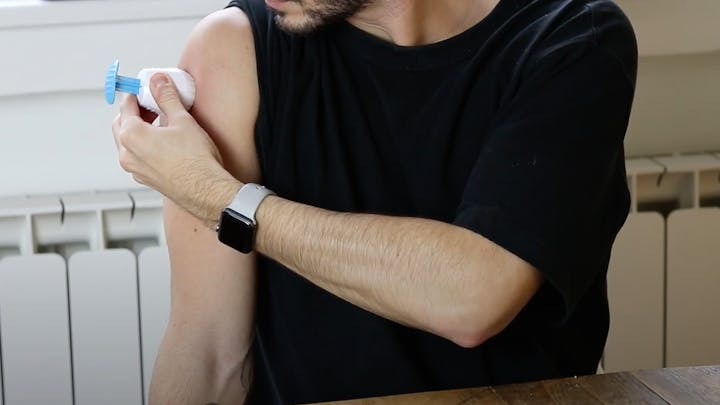Our Tests
Supported by clinicians, driven by data
We provide a comprehensive range of health tests. We work with you to select and launch the right health screening packages for the people in your workforce.
Using cutting-edge diagnostic technology, we’re able to provide accurate, reliable test results that are broken down into simple, digestible information in the Qured app. If a test reveals an abnormality, one of our clinicians will talk your employee through the results, providing actionable advice and suggested next steps. If we spot anything that needs more investigation, we’ll set up a referral to a private medical insurance provider or NHS GP.
Popular health screening packages

Metabolic Health Screen
Metabolic Syndrome affects 1 in 4 adults, with frontline and shift workers twice as at risk. Poor metabolic health is a key driver of long-term absence, early retirement and loss of key skills from the workforce. Assess your workforce's risks with a metabolic health screen.

Diabetes Screen
Diabetes can be symptomless and go undetected for many years. If it’s not managed, it can lead to serious long-term complications, affecting not only health but also productivity and an employee’s ability to perform tasks safely. Detect pre-diabetes and diabetes for early and effective intervention with a simple blood test.

Early Cancer Screen
Over 100,000 working-age adults are diagnosed with cancer in the UK every year. Screen for the early signs and symptoms of the most common cancers, which, as well as the emotional impact on the employee, can cause major business disruption and spiralling insurance premiums. Typically, the sooner cancer is diagnosed and treated, the better the outcome for the employee and their employer.

Men's and Women's Health Screens
Men’s and women’s health screens provide a general health check and look at key hormone levels to identify and reduce the risk of serious illness and chronic conditions. The screen includes a prostate cancer test for men over 40 and a menopause screen for women over 40, with support and advice from a GP during what can be a challenging stage of life.
Full range of tests
General Health
24% of men and 22% of women in the UK are Vitamin D deficient, causing symptoms like fatigue, mood changes and muscle weakness. Our Vital Vitamins test measures essential vitamin and nutrient levels, including Vitamin D, B12, B9, Iron and magnesium, to provide an overall picture of wellbeing and identify where supplements or diet changes may be needed.
Over 50% of UK adults have high cholesterol levels, but many are unaware they have it. 90% of liver disease is preventable, yet it's the third biggest cause of premature death. Our Organ and Body Function test checks critical health markers, including cholesterol levels and kidney, liver and thyroid functions, to predict and prevent major illness in the future.
Over 1 million people in the UK live with undiagnosed Type 2 diabetes. For individuals at a higher risk of diabetes, our blood test measures HbA1c levels - an individual's average blood sugar level for the past three months, which can indicate whether they are pre-diabetic or have diabetes. For lower-risk individuals, we provide a urine test that checks for the presence of glucose.
Every 3 minutes, someone in the UK dies from a heart-related disease. Our Cardiovascular Health check measures the level of high-sensitivity C-reactive protein (hsCRP) in the blood, which corresponds to low-level inflammation and atherosclerosis. This helps identify future risks of cardiovascular disease in healthy individuals.
Reproductive Health
1 in 7 heterosexual couples struggles to conceive, evenly split between males and females. Our female fertility profile looks at hormones such as FSH, Oestradiol, AMH and ovulation testing to help identify potential issues early on, so women can make data-driven decisions about starting a family.
Around 7% of men in the UK are affected by infertility. Our male fertility profile checks testosterone levels and includes semen analysis to provide clarity on male reproductive health.
Screening for common STIs such as gonorrhoea and chlamydia is vital to any fertility screening, as they can often be present without any symptoms. Both can have a major impact on reproductive health and can cause complications for both the mother and baby during pregnancy.
The average age for women becoming menopausal is 51, but 7% will enter menopause early, between 40 and 45. Our menopause profile combines essential hormone tests to measure FSH, Oestradiol and Luteinising hormone with GP support to discuss the transition and any symptoms to help menopausal or peri-menopausal women care best for their health.
Early Cancer Screening
Prostate cancer accounts for 27% of all male cancer cases in the UK. Our prostate cancer screening measures prostate-specific antigen levels taken from a blood sample, which, combined with risk factors and family history, helps provide a reliable indicator of prostate issues.
54% of bowel cancer cases in the UK are preventable. Our bowel cancer test is a faecal immunochemical test, which looks for traces of blood in a stool sample. These may not be visible to the human eye but can be a sign of bowel cancer.
Nearly 100% of cervical cancer cases are preventable. Cervical screening can identify the presence of high-risk forms of human papillomavirus (HPV) through a vaginal self-swab. This doesn’t always mean someone will develop cervical cancer, but it helps identify those at a higher risk or those with precancerous changes.
98% of people diagnosed with breast cancer at its earliest stage survive for 5+ years, dropping to 26% when diagnosed at its latest stage. Regular self-examination ensures people with breasts are used to how they should feel and can detect when something doesn’t feel right, for example, a lump, swelling, or discomfort. If an abnormality is detected, we’ll provide a referral for further investigations to increase the chances of identifying any pre-cancerous or early cancer changes.
Testicular cancer is most common in males aged 30-34. Regular self-examination ensures people with testicles are used to how their scrotum and testes should feel and can detect when something doesn’t feel right, for example, a lump or significant change in shape and size. If an abnormality is detected, we’ll provide a referral for further investigations to increase the chances of identifying any pre-cancerous or early cancer changes.

A new standard for blood collection
The innovative TAP® II blood collection device takes blood from the upper arm using microneedles that are thinner than an eyelash for a truly pain-free testing experience. You'll collect your sample in just a few minutes, then post it to our UKAS-accredited labs for a full analysis. One of our health advisors will guide you through the process via video call from the comfort of your home, to make sure you take your test successfully.

We create your personalised testing plan by combining clinical data, your family medical history, personal risk factors, and demographic information. By focusing on the most common conditions and abnormalities affecting your specific demographic, our goal is to recommend the most relevant tests that can help prevent chronic illnesses and ensure your long-term wellness as your health evolves over time.
Discover what Qured can do for your business
We’ve delivered innovative healthcare benefits to 400 leading businesses, supporting a million customers. Find out what we can do for your people.
